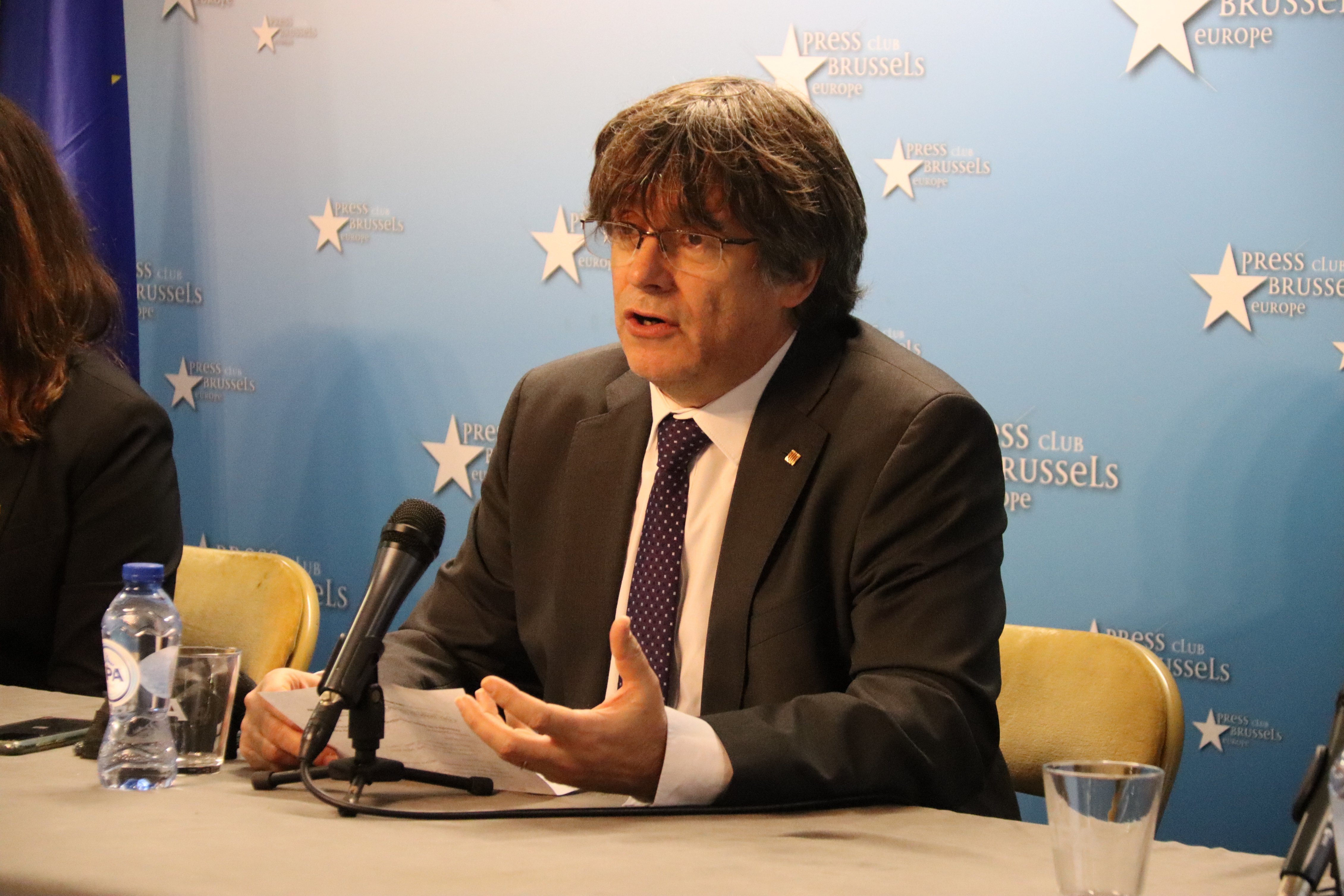Catalonia's political exiles have once again stood up for their objectives, taking advantage of the presentation this Wednesday of the international strategy of the Belgium-based pro-independence body, the Council for the Republic. The Council's leader, president Carles Puigdemont, warned that the return of the exiles must be based on a "victory for fundamental rights" and not on a political pact or personal solutions. The MEP and pro-independence leader gave this warning in a press conference in Brussels in which he explained the will of the Council for the Republic to pursue its international action "without complexes", without fears or limits, in the face of the Spanish state's repression in Catalonia.
Puigdemont made the appearance accompanied by the Council's foreign action commissioner, Adrià Alsina, and Council board member, Neus Tobisco. His statement comes a day after he had replied to the speech of the current Catalan president, Pere Aragonès, publicly urging him to respect the strategy of the exiles and leave it out of the negotiations with the Spanish government. President Aragonès's speech at the MNAC on Monday also provoked a harsh response from the general secretary of the Junts (Together for Catalonia) party, Jordi Sànchez, who criticized the fact that Catalonia lacked strong leadership. Puigdemont is also president of Junts.
Despite the clash that took place on Tuesday between the two Catalan government partners, Puigdemont assured that he did not want to get into an argument with Aragonés. "We decided, and have made an effort, so that I think people perceive that we do interfere with the logic of the [political activity in the] interior. I will not do so now," he replied when asked about the issue. He assured that the role of the Council is not to replace the government of Catalonia but to go places that the government cannot, given that no Spanish court or "any fascist group in opposition" can pursue the action of this organ of exile.
Puigdemont explained that the goal when he and fellow members of the 2017 pro-independence government went into exile was, given the realization that internationalization was essential, to reverse the political conditions that led them to this situation. In this regard, he stressed that he has never sought personal solutions and that "the return must be based on a victory of fundamental rights, not a political pact of a government that wants to get rid of an obviously uncomfortable factor."
In his efforts to evade controversy over internal Catalan politics, he also avoided giving any assessment over the denouement of the case of MP Pau Juvillà and his removal from office, limiting himself to emphasizing that the affair case provides more internationalization of the situation in Spain, demonstrating how "it is being accepted in such a benign way that an elected official can have his way blocked by an administrative body without powers and with clearly political motives". "It helps us to explain things in Europe, it makes things easy for us," he joked.
Leadership of the Council
Puigdemont reclaimed the importance of the Council for the Republic's role in the face of the ambivalent attitude to the body from both the government of Pere Aragonès and the Catalan Republican Left (ERC) party, and defended a joint strategy to lead the international defence of the independence process. "The leadership should come out of that logic. I know I'm not saying anything original because we've been asking for this for 4 years," he said.
The pro-independence leader argued that all those actions abroad that could lead to persecution for representatives of the administration within the Generalitat of Catalonia could be carried out by the Council for the Republic "without fear" and without having to give explanations to any minister or ask permission from any embassy. "The Council must assume functions from which the Catalonia government and its institutions are prohibited," he explained.
Puigdemont recalled that the Council's external projection was legitimized by a motion in Parliament moved by Junts, which was the response to the "coup d'etat of article 155" - "sometimes some of its authors seem embarrassed and act as if it hadn't happened, but it was one of the most serious attacks on the fundamental pillars of European democracy," he said, adding that the body has the support of more than 102,000 people - the number who have made an active commitment to the Council.
Alsina stressed that Catalonia has a problem explaining itself internationally in the face of the Spanish states decision to persecute the Generalitat's foreign action, taking action against political office holders "simply for travelling to places, knocking on doors and talking about politics". For this reason, he defended the international network promoted by the Council, which he described as a "free foreign ministry", with representatives out in the world dedicated to explaining the conflict that Catalonia has with the Spanish state. To this end, he appealed to Catalans living abroad to consider whether they could represent the Council, inviting them to register on the Council's website.
Torbisco spoke about the current situation of the Catalonia-Spain conflict, in the fifth year since the 2017 referendum: the Spanish state has not promoted any dialogue strategy, the repression has not stopped, and that the pardons and the reduction of sentences should never be interpreted as acts of good faith. "The state's route to a solution is indignant, because it leads us to assume the inevitability of these violations of rights and the endemic subordination that characterizes our relationship with Spain," he warned.

